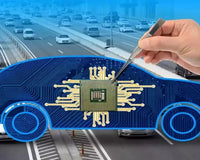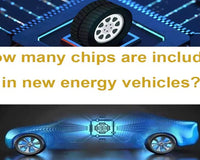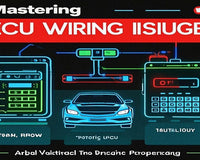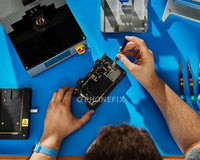In the intricate world of modern automotive engineering, the engine management system (EMS) stands as a cornerstone of vehicle performance, efficiency, and environmental friendliness. At the heart of this sophisticated system are integrated circuit (IC) chips, which play a multifaceted and indispensable role in ensuring that engines operate at their optimal levels.
The Electronic Control Unit (ECU), often referred to as the "brain" of the engine, is where IC chips truly shine. The ECU is a microcontroller-based device that processes the data received from multiple sensors. Inside the ECU, there are several specialized IC chips, each designed to perform specific tasks.
Sensor IC Chips
Engines are equipped with a plethora of sensors, such as the Mass Air Flow (MAF) sensor, Oxygen (O₂) sensor, Crankshaft Position sensor, and Temperature sensors. Sensor interface IC chips are responsible for conditioning the signals from these sensors. They convert the raw analog signals from sensors into digital signals that the ECU's main microcontroller can understand. For example, the MAF sensor measures the amount of air entering the engine.
Microcontroller IC Chips
The microcontroller IC chip in the ECU is the central processing unit for engine management. It has the computational power to execute complex algorithms. Based on the data received from the sensor interface IC chips, the microcontroller determines the appropriate control actions. For instance, when the engine is idling, the microcontroller adjusts the idle air control valve (through an actuator driver IC chip, which will be discussed later) to maintain a stable engine speed.
Driver IC Chips
Once the ECU's microcontroller has decided on the control actions, actuator driver IC chips come into play. These chips are responsible for driving the actuators that actually make the physical changes in the engine. For example, the fuel injector is an actuator that sprays fuel into the engine's combustion chamber. The actuator driver IC chip receives a control signal from the microcontroller and converts it into a high-current signal capable of opening and closing the fuel injector at the precise moment and for the right duration.
Functions of IC Chips in Engine Management.
1. Data Processing.
IC chips are at the heart of modern engine control units (ECUs). They analyze data from various sensors, such as oxygen sensors, throttle position sensors, and temperature sensors. This data helps determine the optimal timing for fuel injection and ignition, ensuring efficient engine operation while minimizing emissions.
2. Control of Fuel Injection Systems.
The chips regulate the fuel injection process to match engine conditions. By adjusting the amount and timing of fuel injected into the engine cylinders, ICs help maximize fuel efficiency and power output, crucial for meeting regulatory standards on emissions.
3. Ignition Timing Control.
IC chips control when the spark plug ignites the air-fuel mixture within the engine cylinders. Accurate ignition timing is essential for performance and efficiency, allowing the engine to operate smoothly across different conditions. Precise control is achieved through algorithms programmed into the IC to adapt to various driving conditions and vehicle loads.
4. Adaptation to Environmental Conditions.
Modern engines need to adapt to various environments, including temperature and altitude changes. IC chips facilitate this adaptation by processing sensor data and adjusting engine parameters accordingly. For example, the chips help manage engine performance in cold starts to ensure optimal operating temperatures are reached quickly.
5. Communication with Other Systems.
IC chips in engine management systems often communicate with other vehicle systems, such as transmission control and anti-lock braking systems (ABS), to enhance overall vehicle performance and safety. This integration enables more sophisticated features like adaptive cruise control and stability management, contributing to better handling and driver assistance.
As automotive technology continues to evolve, the role of IC chips in engine management will only become more critical. With the increasing push towards electric and hybrid vehicles, IC chips will be involved in managing not only the internal combustion engine, but also the battery management system, electric motor control, and power electronics. For example, in hybrid vehicles, IC chips will be used to coordinate the seamless transition between the internal combustion engine and the electric motor, optimizing power delivery and energy recovery during braking.
IC chips are the unsung heroes of engine management. They are the key enablers that allow engines to operate efficiently, powerfully, and cleanly. As the automotive industry continues to innovate, the importance of these tiny but mighty components will only grow, shaping the future of transportation for years to come. If you are looking for high-quality car chip, you can visit the China ecufixtool shop.










